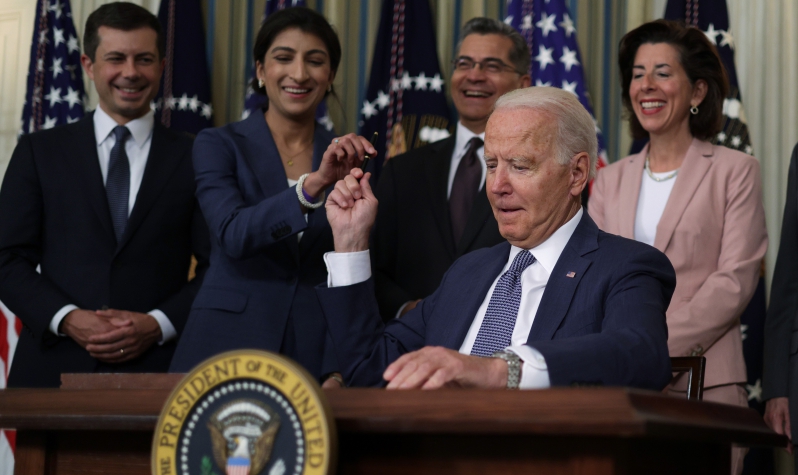
Harmonizing two approaches to antitrust law reform may protect consumer and market welfare most effectively.
Lina Khan, the new Chair of the Federal Trade Commission (FTC), has become the leading spokesperson for the large number of Americans who seek radical changes in antitrust law. It would be extremely difficult, however, for Khan to implement her radical agenda. Beyond uncertainty as to whether the FTC holds the power to make dramatic changes, her agenda may face strong resistance from courts that long ago rejected her approach to antitrust law.
But there is an easy path toward the reform of antitrust law. The proponents of radical change should join hands with the proponents of incremental change to implement a series of reforms that further the goals of both groups.
Khan argues that lawmakers should replace the consumer welfare standard, which measures competition by assessing short-term effects on price and output in markets, with a more multifaceted standard. This new standard would prioritize the protection of small businesses, jobs, and the U.S. political system from firms that are too large and powerful.
Khan also contends that the United States should replace the case-by-case method of decision-making and the rule of reason—a legal doctrine used to assess unreasonable restraints on trade—with a long series of per se prohibitions on practices that she considers to be unfair. She also suggests that antitrust law should impose remedies such as divestiture and price regulation on platform firms.
To increase the likelihood of long-term success, Khan should consider the approach of traditional industrial organization scholars and antitrust scholars who have urged incremental changes in antitrust law for years. Incremental changes would move antitrust law in the direction that Khan prefers, while also being a direction well-supported by studies and more likely to be embraced by the courts.
For example, antitrust law could easily place more emphasis on combatting monopsony power, or the ability of a single buyer to control a market. Lawmakers could bolster protections for employees who are injured by widespread anticompetitive practices.
It has long been illegal for a company to enter into a no-poaching agreement with a competing employer, or to include a non-compete clause in an employment contract in the absence of a strong justification for the clause. Yet both practices are now common. Agencies and the courts should aggressively enforce existing prohibitions against these practices.
Notably, proponents of incremental change have urged changes of this type for years. They support the need for changes with excellent scholarship that documents the severe harm that no-poaching agreements and the widespread use of noncompete clauses in low-wage employee contracts inflict on workers.
Such changes have received approval across bipartisan lines and from the courts. Many Republicans agree that a need exists for such changes, and the FTC and the U.S. Department of Justice Antitrust Division were already moving in that direction at the end of the Trump Administration. Furthermore, in the 2021 case National Collegiate Athletic Association v. Alston, the U.S. Supreme Court made clear its strong and unanimous support for use of antitrust law to improve the performance of labor markets.
For years, proponents of incremental changes in antitrust law have also called for several types of major changes in merger law and policy. First, John Kwoka, professor at Northeastern University, has documented the adverse effects of many of the mergers that the FTC or the Justice Department declined to oppose. Those mergers created unduly concentrated markets with resulting increases in price. That problem is easy to remedy by changing the measures of market concentration in the joint horizontal merger guidelines that the FTC and the Justice Department use to determine when a proposed merger creates the risk of an unduly concentrated market.
Second, many traditional scholars also urge the FTC and the Justice Department to put a halt to “Pac-Man” acquisitions—the hundreds of acquisitions of small competitors that the large platform firms have made in recent years. That change is also easy to make by changing the market concentration measures in the horizontal merger guidelines.
Finally, many traditional scholars have long encouraged the FTC and the Justice Department to challenge vertical mergers among large firms, which create a serious risk of harming the performance of markets by raising rivals’ costs. The FTC and the Justice Department can use law and policy to mitigate such risks by publishing new joint guidelines on vertical mergers. They can then defend their application of the new guidelines in court by relying on the many scholarly studies that support the need for this change.
Proponents of radical change and proponents of incremental change may also be able to find common ground in identifying and prohibiting the abusive practices of some platform firms. Many traditional scholars who oppose proposals to dissolve platform firms or to subject them to price controls also admit that many of their behavioral patterns cause serious harm to market performance. They agree that the courts have made it too difficult for enforcement agencies to prohibit those practices.
In the recent case of Ohio v. American Express, the Supreme Court divided 5–4 in its first effort to address antitrust problems created by platform firms. Many traditional scholars argue that the majority erred when its opinion combined the difficult-to-satisfy rule of reason with a duty to consider simultaneously both sides of the two-sided markets that platform firms confront.
It is entirely realistic to believe that the proponents of radical change can team up with the proponents of incremental change to persuade at least one Supreme Court justice to join the four dissenting justices in accepting evidence showing that the practice harms one side of the two-sided market.
Some proponents of radical change in antitrust law will be tempted to resist this proposed alliance with traditional antitrust scholars and to characterize it as a suggestion that they capitulate. The best response is an apt cliché: Do not let the perfect be the enemy of the good.




